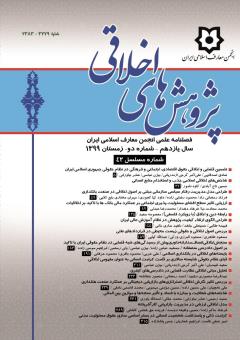تحلیل مبانی اخلاقی نظارت قضایی در دادرسیهای کیفری
محورهای موضوعی : اخلاق و تربیت اسلامیعبدالرضا منصوری دهبید 1 , احمد رمضانی 2 * , منصور عطاشنه 3
1 - واحد قشم، دانشگاه آزاد اسلامی، قشم، ایران.
2 - دانشگاه علم و فرهنگ، تهران
3 - دانشگاه شهید چمران
کلید واژه: نظارت اخلاقی, موازین اخلاقی, کرامت ذاتی انسانی, فرض بی¬, گناهی, اشتباهات قضایی,
چکیده مقاله :
وضع و تدوین قوانین و مقررات متعدد منطبق با موازین اخلاقی همگی ناشی از شناخت و احترام به وجود کرامت ذاتی برای افراد می باشد. کرامت ذاتی انسان ایجاب می نماید که در فرآیند رسیدگی های کیفری الزاماتی در راستای حفظ و رعایت این شاخصه جهت حمایت از حقوق طرفین خصوصاً متهمین پیش بینی گردد. فرض بی گناهی یا اصل برائت، اصل حاکمیت قانون، اصل پاسخگویی و جلوگیری از انحراف دادرسی و اشتباهات قضایی را می توان در زمره مهم ترین مبانی اخلاقی نظارت قضایی قلمداد نمود. در این راستا رعایت حقوق شهروندی، در بعد داخلی و بین المللی که نمود آن در قانون آئین دادرسی کیفری مصوب 1392 متجلی گردیده، منجر شده، نظارت قضایی برعملکرد مقامات قضایی در فرآیند تعقیب و تحقیق بدین لحاظ که با حقوق اساسی افراد در ارتباط می باشد موردتوجه خاص مقنن قرارگیرد.ب اشناسایی قانون در دادرسی های کیفری و به تبع آن مسولیت و پاسخگو بودن مقامات قضایی مرتبط از تعدی و نقض حقوق افراد خصوصاً متهمین جلوگیری به عمل می آید؛ با این اوصاف نگارندگان در این مقاله با روش تحلیلی – توصیفی به واکاوی تعیین فلسفه و مبانی اخلاقی وجودی تأسیس حقوقی نظارت قضایی در نظام-های دادرسی کیفری نوین می باشند.
The enactment of numerous laws and regulations in accordance with ethical standards all results from knowing and respecting the inherent dignity of individuals. The inherent dignity of the human being requires that due process be observed in the process of criminal proceedings in order to maintain and uphold this criterion to protect the rights of the parties, in particular the accused. The premise of innocence or the principle of absurdity, the principle of the rule of law, the principle of accountability and the avoidance of distortion of justice and judicial errors can be considered as one of the most important ethical principles of judicial supervision. In this regard, the observance of citizenship rights, in the domestic and international context as reflected in the Code of Criminal Procedure adopted in 2013, has led to judicial oversight of judicial authorities' conduct in the process of prosecution and investigation in relation to the fundamental rights of individuals. Special attention is given to the law. The basic principles of the law in criminal proceedings, and consequently the responsibility and accountability of the relevant judicial authorities, to prevent the abuses and violations of the rights of individuals, in particular the defendants; Descriptive analysis of the philosophy and ethical foundations of the legal establishment of judicial oversight in modern criminal justice systems.
آقایی جنت مکان، حسین(1396). حقوق دادرسی عادلانه و منصفانه، تهران: انتشارات جنگل، چاپ اول.
ابراهیم آبادی، غلامرضا (1388). پاسخ گویی: مسایل و ابعاد آن، مطالعات سیاسی ، شماره10.
اخوان کاظمی، بهرام(1392). نظارت در نظام اسلامی، تهران: پژوهشگاه فرهنگ و اندیشه اسلامی، چاپ اول.
اعتمادی، علی؛ شاملو، باقر، علیمرادی، امان اله و احمدی موسوی، سیدمهدی(1398). جایگاه احترام به کرامت انسانی در ارتقای اقتدار قضایی، فصلنامه تحقیقات حقوق تطبیقی ایران و بین¬الملل، سال دوازدهم، شماره چهل و ششم.
ایزددهی، سیدسجاد(1390).مبانی فقهی نظارت بر قدرت از دیدگاه امام خمینی ره، تهران: موسسه چاپ و نشرعروج، چاپ اول.
خالقی، علی(1394). نکته¬ها در قانون آیین دادرسی کیفری، تهران: انتشارات موسسه پژوهش¬های حقوقی، چاپ پنجم.
شاملو، باقر(1391). اصل برائت کیفری در نظام¬های نوین دادرسی، علوم جنایی: مجموعه مقالات در تجلیل از استاد دکتر محمد آشوری، تهران: انتشارات سمت، چاپ پنجم.
شمس ناتری، محمد ابراهیم(1391). اصل برائت و موارد عدول از آن در حقوق کیفری، علوم جنایی: مجموعه مقالات در تجلیل از استاد دکتر محمد آشوری، تهران: انتشارات سمت، چاپ پنجم.
رجبی تاج میر، ابراهیم(۱۳98). حق دسترسی به وکیل در تحقیقات پلیسی، تهران: انتشارات مجد، چاپ اول.
رحیمی¬نژاد، اسمعیل(۱۳87). کرامت انسانی در حقوق کیفری؛ تهران: بنیاد حقوقی میزان، چاپ اول.
عمیدزنجانی، عباسعلی و موسی زاده، ابراهیم(1396). نظارت براعمال حکومت و عدالت اداری، تهران: انتشارات دانشگاه تهران، چاپ دوم.
علیخانی،علی اکبر (1384). پاسخ گویی در نظام جمهوری اسلامی ایران، دوفصلنامه دین و ارتباطات، پژوهش دانشگاه امام صادق،شماره26.
فتحی، محمدجواد؛ هادی دادیار (1391). جایگاه دادستان در سیاست جنایی نوین و الزامات دادرسی عادلانه، نشریه علمی و پژوهشی فقه و حقوق اسلامی، سال چهارم، شماره هفتم.
قربانی، علی و موحدی، جعفر(1390). اصل برائت در اندیشه¬های فقهی و فرض بی گناهی در اندیشه¬های اروپایی، مجله فقه و مبانی حقوق اسلامی، شماره 26.
قرشی زاده، میرناصر؛ جمشیدی، علیرضا و رحمدل، منصور(1398)؛ جایگاه و موقعیت قاضی در تحقق اصول دادرسی عادلانه، فصلنامه تحقیقات حقوق تطبیقی ایران و بین¬الملل، دوره 12، شماره۴3.
قهقایی، طاهره(1392). پاسخ گویی درنظام جمهوری اسلامی ایران، پایان نامه دوره کارشناسی ارشد، دانشگاه مازندران .
غلاملو، جمشید و فرجیها، محمد (1393). محکومیت بی¬گناهان: از خطای قضایی تا بیگناهی واقعی، فصلنامه پژوهش حقوق کیفری، سال سوم، شماره 8.
مدی، بهنام(1392). بررسی گستره اعمال فرض برائت توسط دادگاه اروپایی حقوق بشر، مجله پژوهش¬های حقوق جزا و جرم شناسی، شماره .
منصورنژاد، محمود(1378). تفکیک قوا، ولایت مطلقه فقیه و استقلال قوا، فصلنامه حکومت اسلامی، شماره11.
یوسفیان شوردلی، بهنام و رسولی آستانه، لیلا(۱۳92). نگرش تطبیقی به جبران خسارت واده شده بر محکوم بی¬گناه: از نظر تا واقعیت، مجله حقوقی دادگستری، شماره ۸۲.
Forst, B. (2004) Errors of justice: Nature, sources, and remedies. New York: Cambridge University Press.
Mollah M.A.H. (2018) Judicial Oversight of Bureaucracy. In: Farazmand A. (eds) Global Encyclopedia of Public Administration, Public Policy, and Governance. Springer, Cham
Bubalo,Lana&Pajic,Denes.(2019).In dubio pro reo principle in modern criminal procedure.vol1.University of Stavanger.

